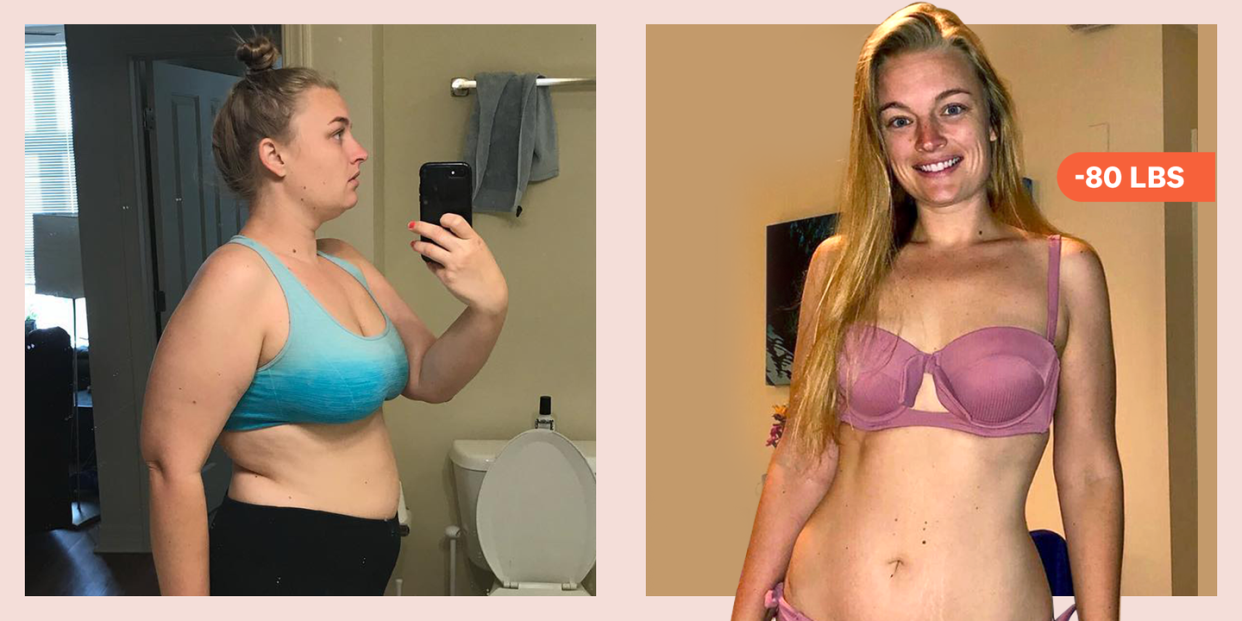'How I Lost Over 80 Pounds And Finally Stopped Emotional Eating With Keto And The 16:8 Diet'

My name is Allie Burk. I’m almost 30 and from the Cincinnati area. I work as a teacher.
I struggled with my weight since 4th grade. I can distinctly remember the first time I noticed that I was overweight: An adult at my school called me "big girl"and it truly hit me to the core.
I would hide candy wrappers and food from my family. I also began to emotionally eat and would use food as a crutch to make me feel happy when I was sad and give me something to do when I was bored. As I got older, I couldn't help but feel discouraged by the fact that I wasn't the same size as my friends were.
In middle school and high school, I played soccer all the time, which helped me get in shape a bit. But I was still eating whatever I wanted, whenever I wanted. After high school and into college, I stopped playing soccer and gained, well, more than just the Freshman 15.
I tried all kinds of diets. But I would lose a few pounds only to gain them all back and more as soon as I got tired of tracking or tired of eating the same foods. I continued gaining until I ended up at 245 pounds. That's where I stopped weighing myself; I couldn't bear to see my weight any higher.
My turning point
In 2017, I saw pictures from a friend's wedding and felt hurt and ashamed of the way I looked. I was also experiencing some health issues that I thought might be related to my weight and overall unhealthy lifestyle.
So I started my health journey that December, and I began solely by working out and getting into cardio. Months later, in May 2018, I felt ready to overhaul my diet. I first tried to follow a point system, where I assigned point values to food and had an allotted number of points to eat within per day. I ended up eating whatever I wanted as long as it fit my points, not thinking about nutritional value, which ultimately led to me bingeing. I decided to try the keto diet instead and I haven't looked back since.
The keto diet gives me energy, I don't feel bloated or uncomfortable after I eat, and I don't feel deprived or starving. With keto, I eat real, whole foods that make me feel good. About five months into my journey, I also started to do 16:8 intermittent fasting (which is when you eat all of your meals within an 8-hour period each day, like between noon and 8 p.m, for instance).
I have lost over 80 pounds since starting my weight-loss journey in 2017. Before I changed my life, I was pre-diabetic and struggled with binge eating and emotional eating. But keto has helped me gain back some control in those areas. I’ve learned that my journey is my own, though, and what works for me may not work for everyone. And on the flip side, I now know that I don't have to follow exactly what everyone else has done—I have to lean in to what works for me.
What I eat in a day now
Breakfast: Bacon and cheese omelette with half an avocado
Lunch: Lettuce wraps, salads, or dinner leftovers
Snacks: String cheese, cucumber slices, nuts, nut butter, or berries
Dinner: Salmon cooked in coconut oil with some type of green, topped with ghee
Dessert: ChocZero chocolate
How I sweat
I started running and working out at a gym when I begin my weight-loss journey, and I still love working out this way. I often watch documentaries to help the time pass. I really love food-focused documentaries.
My longest cardio session to date was when I got so absorbed in The Magic Pill documentary; I was so intrigued by the power of food and what it could and couldn't do for my body. (That was when I went home and started researching keto and how it could help my health and weight loss!)
My top three tips for success
1. Be consistent. When I am consistent and repeat the habits and behaviors that are working for me, I see results. When I bounce around and don't keep up with what's making me feel good and strong and successful at any given point, I can feel it. Don't fix what isn't broken.
2. Keep it simple. You don't have to make complicated recipes with crazy ingredients to see results. Try your best to consume real, whole foods that make you feel good.
3. Find what works for you. People have sooo many opinions about what you should and shouldn't do to lose weight, or what you should and shouldn't eat. Honestly, none of those opinions matter except for your own and that of any MDs, therapists, or dietitians that you trust and who believe in you. Do what works well for your lifestyle and for your mental health. Your health journey isn't going to be a quick fix, and you have to figure out what the habits are that you can sustain. It will take time, but you are worth it.
You Might Also Like